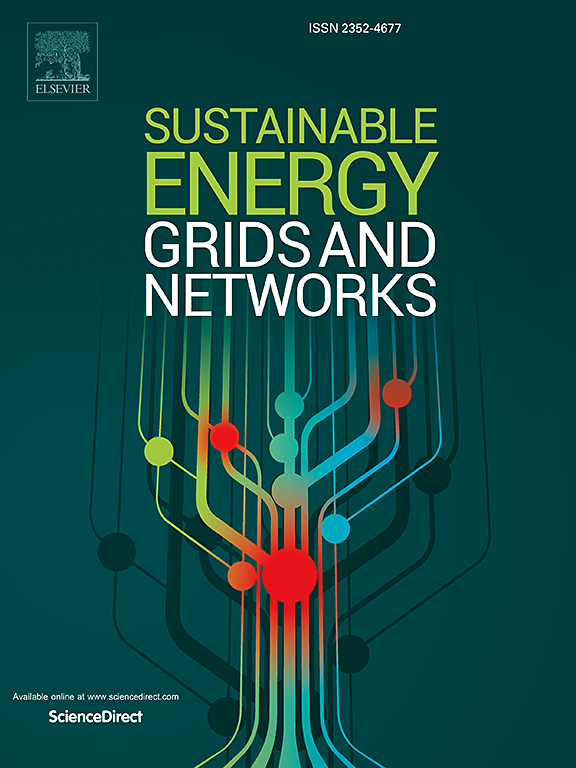A two-level decomposition algorithm for robust unit commitment in large-scale power systems with variable wind generation
IF 5.6
2区 工程技术
Q2 ENERGY & FUELS
引用次数: 0
Abstract
As wind generation integration in power systems has become more common, the two-stage robust unit commitment (TSR-UC) problem, which accounts for wind power uncertainty, has emerged as a critical research area. For large-scale power systems, the TSR-UC has a large computational burden and difficulty obtaining an optimal solution in an acceptable amount of time. To address this problem, we propose a two-level decomposition algorithm for TSR-UC to reduce the complexity of the model from the time dimension. In the first level, the column and constraint generation (C&CG) algorithm is used to split the original problem into a master problem and a subproblem. In the second level, the entire scheduling horizon is partitioned into several consecutive intervals, and the C&CG master problem is further decomposed into smaller-scale problems by replicating the variables in the last period of each interval and introducing on/off time counters. Similarly, the C&CG subproblem is decomposed into smaller-scale subproblems by introducing an uncertainty subset budget. Moreover, the analytical-target-cascading algorithm, coupled with an effective initialization strategy, is proposed to solve the decomposed C&CG master problems/C&CG subproblems in parallel. Finally, numerical experiments across three different scales of power systems demonstrated that the proposed algorithm significantly enhanced solution speed while maintaining solution quality compared with the C&CG algorithm.
大型变风力发电系统鲁棒机组承诺的两级分解算法
随着风力发电在电力系统中的集成越来越普遍,两阶段稳健机组承诺(TSR-UC)问题已成为一个重要的研究领域,该问题解释了风力发电的不确定性。对于大型电力系统,TSR-UC计算量大,难以在可接受的时间内获得最优解。为了解决这一问题,我们提出了一种TSR-UC的两级分解算法,从时间维度上降低模型的复杂性。第一级采用列约束生成(C&;CG)算法,将原问题分解为主问题和子问题;在第二层,将整个调度水平划分为几个连续的区间,通过复制每个区间最后一个周期的变量并引入开/关时间计数器,将C&;CG主问题进一步分解为更小的问题。同样,通过引入不确定性子集预算,将C&;CG子问题分解为更小的子问题。在此基础上,提出了解析-目标-级联算法,结合有效的初始化策略,并行求解分解后的C&;CG主问题/C&;CG子问题。最后,通过三种不同规模电力系统的数值实验表明,与C&;CG算法相比,该算法在保持求解质量的同时显著提高了求解速度。
本文章由计算机程序翻译,如有差异,请以英文原文为准。
求助全文
约1分钟内获得全文
求助全文
来源期刊

Sustainable Energy Grids & Networks
Energy-Energy Engineering and Power Technology
CiteScore
7.90
自引率
13.00%
发文量
206
审稿时长
49 days
期刊介绍:
Sustainable Energy, Grids and Networks (SEGAN)is an international peer-reviewed publication for theoretical and applied research dealing with energy, information grids and power networks, including smart grids from super to micro grid scales. SEGAN welcomes papers describing fundamental advances in mathematical, statistical or computational methods with application to power and energy systems, as well as papers on applications, computation and modeling in the areas of electrical and energy systems with coupled information and communication technologies.
 求助内容:
求助内容: 应助结果提醒方式:
应助结果提醒方式:


